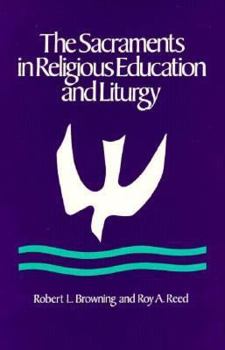The Sacraments in Religious Education and Liturgy: An Ecumenical Model
Select Format
Select Condition 
Book Overview
No Synopsis Available.
Format:Paperback
Language:English
ISBN:0891350446
ISBN13:9780891350446
Release Date:January 1985
Publisher:Religious Education Press
Length:313 Pages
Weight:1.25 lbs.
Dimensions:1.0" x 6.1" x 9.0"
Customer Reviews
1 rating
Forging connections between theory and practice
Published by Thriftbooks.com User , 20 years ago
'The Sacraments in Religious Education and Liturgy: An Ecumenical Model' by Robert L. Browning and Roy A. Reed is a book we have used at my seminary for liturgy and Christian education classes. It is well-written and thorough in its approach to giving basic history of practice, current theory, and possible future approaches to sacramental practice in churches, with a particular emphasis on how the congregations can be educated about what they are doing, and why they are doing it. Perhaps given my vocation, it would come as no surprise that my favourite chapter deals with the sacrament of ordination. `Priests are ordained precisely in order to reveal to each vocation its priestly essence.' (p. 224) In reading Browning and Reed, with particular emphasis on the chapter concerning ordination, I was impressed by arguments that more clearly stated that which I had been striving to articulate for some time. I emphasised on my application to seminary that I saw the role of the ordained ministry as that which empowers all the people of the church, to be a teacher and servant as much as anything else, to bring out the gifts of ministry of the rest of the church. I particularly appreciated the emphasis on the mutuality of the ordained office, and the inclusivity of the vision of ministry. `Ordained, full-time clergy need clearer self-understandings and a stronger sense of identity mutually agreed upon in the faith community.' (p. 225) While I resist Browning and Reed's use of the term `consecration' for the recognising and charging of lay ministers within and beyond the church (for that term has other connotations for my tradition), I agree with their view that the ministries of the laity are of equal importance with that of the ordained, differing more in terms of function than in merit. In the course of their discussion of ordination, they discuss Max Thurian's idea of repeatable sacraments like confirmation. Thus, as the nature of vocation changes or strengthens for an individual, a new commitment to the church and the ministry to which all are called through baptism can be celebrated. This could underscore the importance of the ministry of all, if all are invited to recognise and celebrate their own ministry being reflected in the ordination, consecration, or reaffirmation. One problem that can arise (indeed, did arise in my case) is also discussed, and that is the all-too-human tendency toward selfishness and mistrust. `Clergy are sometimes threatened by active, knowledgable, questioning laity. Often laity like to think they are paying the clergy to perform the ministry and mission of the church.' (p. 228) When the clergy are insecure in their own knowledge or position, a strengthening of the laity becomes a threat. Likewise, where the laity have not been educated about the importance of their own ministry, a mistrust can arise, whereby they might think the clergy are being lazy or shirking of their responsibilities by encouraging the laity. Perhaps mo




